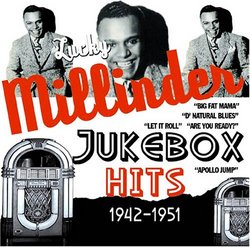| All Artists: Lucky Millinder Title: Jukebox Hits: 1942-1951 Members Wishing: 0 Total Copies: 0 Label: Acrobat Release Date: 1/25/2005 Album Type: Import Genres: Blues, Jazz, Pop, Rock Styles: Regional Blues, New York Blues, Jump Blues, Swing Jazz Number of Discs: 1 SwapaCD Credits: 1 UPCs: 824046402921, 803680993606 |
Search - Lucky Millinder :: Jukebox Hits: 1942-1951
 | Lucky Millinder Jukebox Hits: 1942-1951 Genres: Blues, Jazz, Pop, Rock
|
Larger Image |
CD Details |
CD ReviewsSwing Band Deluxe 06/01/2007 (5 out of 5 stars) "When the subject of swing bands comes up in any discussion, the names of Benny Goodman, Harry James, Glenn Miller, Artie Shaw and The Dorseys will certainly crop up. Few, sadly, will bring up the name Lucky Millinder, and yet, from a historical standpoint, never mind the quality of his product, none were better.
Born Lucius Millinder on August 8, 1900 in Anniston, Alabama, Lucky started out fronting the Mills Blue Rhythm Band in the 1930s before forming his own. Over the years, this featured the likes of trumpeters Dizzy Gillespie, Freddie Webster and Archie Johnson, pianists Bill Doggett and Clyde Hart, saxophonist/violinist/clarinetist Benjamin "Bull Moose" Jackson, singer/tenor saxophonist Big John Greer, alto saxophonist Tab Smith, tenor saxophonists John Hardee, Sam "The Man" Taylor, and Stafford "Pazuza" Simon, guitarist/singer Sister Rosetta Tharpe, and singers Wynonie "Mister Blues" Harris, Ernestine "Anisteen" Allen, and Trevor Bacon. From 1942 to 1951 he registered 19 hit singles on the Pop and R&B charts, including five that reached # 1. And every one of those hits is in this wonderful compilation from Acrobat Records, complete with quality sound, ten pages of informative liner notes written in August 2003 by Dave Penny, and a complete discography of the contents. With a recording contract from Decca, Lucky kicked things off in January 1942 with Big Fat Mama which, featuring vocalist Trevor Bacon, made it to # 23 on the Pop charts. That was followed later that summer by the two- sided hit Shout, Sister, Shout! (# 21 Pop) and I Want A Tall Skinny Papa (# 13 Pop), both sides introducing Sister Rosetta Tharpe who shared some of the vocals with the band. Not long after, Billboard introduced The Harlem Hit Parade, forerunner of what is now known as the R&B charts, and in December 1942, with Trevor Bacon again doing the vocals, and Dizzy Gillespie a trumpet solo, When The Lights Go On Again (All Over The World) scored at # 1 R&B and # 14 Pop. In February 1943 he had his second # 1 when the instrumental Apollo Jump reached the top of the R&B charts, followed in April by Are You Ready? in which Bacon and the band exchange vocals and Gillespie is again featured (# 20 Pop). December saw a return to the charts of When The Lights Go On Again, this time reaching # 20 Pop, and yet another # 1 R&B in Sweet Slumber (Bacon on vocal), which also peaked at # 12 Pop early in 1944. In August 1944, with Wynonie Harris doing the vocals, Hurry, Hurry! topped out at # 24 Pop and, for the better part of a year, that would be it insofar as a hit single was concerned. In June 1945, however, he scored his best hit when Who Threw The Whiskey In The Well? soared to # 1 R&B (and remained there for 8 weeks), as well as # 7 Pop, with Harris again doing the vocals. Another lean period followed until June 1946 when he had two songs competing on the charts. Shorty's Got To Go, with Lucky and the band doing the vocals, peaked at # 4 R&B on Decca, while on the small independent Queen label, I Know Who Threw The Whiskey (In The Well) also reached # 4 R&B billed to Bull Moose Jackson & His Orchestra, but this was, in reality, Lucky's band, with Jackson doing the vocals. They did the same with I Love You Yes I Do - billed to Bull Moose Jackson & His Buffalo Bearcats - and it too soared to # 1 R&B (3 weeks) and # 24 Pop in February 1948 (there's an interesting story behind this in the liner notes). No further hits followed until the spring of 1949 when, now with RCA Victor, the instrumental D'Natural Blues (same melody as The Hucklebuck) made it to # 4 R&B with the flipside, Little Girl, Don't Cry (Big John Greer doing vocals) making it to # 15 R&B. Late in 1950, by which time Wynonie Harris had been recording on his own for four years, and Millinder had switched to King Records, they collaborated again, and shared the billing, on Oh Babe! which topped out at # 7 R&B. Another RCA recording then appeared in January 1951 when I'll Never Be Free peaked at # 8 R&B with vocals by Anisteen Allen and Big John Greer. Later that spring he had his last hit single with I'm Waiting Just For You, a King release that spent 8 weeks at # 2 R&B (kept from the top by Sixty-Minute Man by The Dominoes) and also reached # 19 Pop, with vocals by Anisteen and John Carol. In 1957 Pat Boone would cover it for Dot Records. Most highly recommended for any fan of big band swing." |

 Track Listings (20) - Disc #1
Track Listings (20) - Disc #1